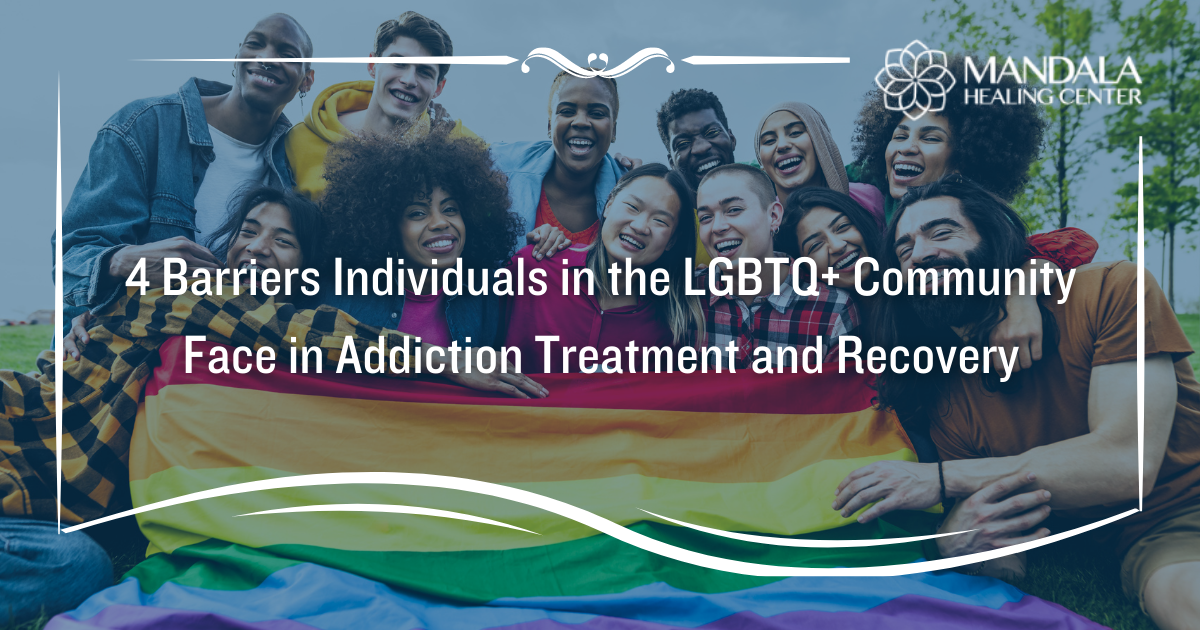Addiction is a complex disease that affects a wide range of people from every race, gender, class, and religion. While substance abuse affects people from all walks of life, some populations face a set of unique challenges when it comes to addiction and recovery. One of the minority groups that are exceptionally vulnerable to substance abuse is the LGBTQ+ community.
People who belong to the LGBTQ+ community face discrimination, social isolation, rejection from loved ones, and even threats of violence solely due to their sexual orientation. Unfortunately, these factors put them at a higher risk of developing a substance use disorder. Even worse, when members of the LGBTQ+ community are ready to seek help for their substance misuse problems, they face unique barriers that prevent them from receiving the professional help they need.
Understanding the barriers individuals in the LGBTQ+ community face in addiction treatment and recovery can allow you to help your loved one overcome them and receive the professional support they need.
What Barriers to Recovery that Individuals in the LGBTQ+ Community Face?
People who do not belong to a marginalized group face barriers to addiction recovery as well. The main barriers to recovery for the general population include a shortage of beds in treatment centers, lack of insurance, stigma, and a lack of finances. When you belong to the LGTBTQ+ community, you face the general barriers to recovery as well as the obstacles that arise due to the discrimination that is perpetuated against members of your community.
Four barriers to recovery that you may face as a member of the LGBTQ+ community.
1. High Rates of Unemployment and Poverty
Members of the LGBTQ+ community face higher rates of unemployment and poverty than the general population. For example, UCLA found that while 16% of cisgender and straight individuals live in poverty, 22% of LGBTQ+ people live in poverty.[1]
When you suffer from addiction and poverty, it can be extremely difficult to access the treatment you desperately need. Drug and alcohol rehab programs are extremely expensive if you do not have health insurance. This is one of the many reasons that individuals in the LGBTQ+ community have a hard time accessing professional help.
If you are struggling to overcome this barrier, there are a few routes you can take to secure addiction treatment. The first option would be to find a free health insurance plan that will pay for your treatment, like Medicaid or Medicare. Another way to overcome this barrier is to find a treatment center that offers payment options like sliding scale fees or scholarships.
2. Social Isolation and Rejection
It is widely accepted that a vital aspect of addiction recovery is having support from close friends and family members. Having a support system can help keep you accountable and motivated to continue in your journey of recovery.
Unfortunately, many members of the LGBTQ+ community face the following issues:[2,3,4]
- 4 in 10 LGBTQ+ individuals face rejection from family members and friends
- Face higher rates of abuse from those close to them
- Twice as likely to face homelessness than straight, cisgender individuals
As you can see, people who belong to the LGBTQ+ community face higher rates of social isolation and rejection than the general population. This means they are less likely to have a support system to motivate them to seek help for addiction.
3. History of Discrimination in the Healthcare Setting
While many people receive health care coverage from their spouse’s job, members of the LGBTQ+ community have a difficult time doing so. To explain, many employers do not offer insurance to same-sex domestic partners and when they do, they have to pay tax on the insurance while heterosexual couples do not. This is a form of healthcare discrimination against LGBTQ+ people that makes it difficult for them to obtain addiction treatment.
Additionally, transgender individuals who do manage to obtain healthcare have to worry about discrimination in the doctor’s office. Many insurance companies make transgender people the target of specific exclusions that prevent them from receiving gender-affirming care that could save their lives. Facing this kind of discrimination in the healthcare setting can make you more likely to suffer from suicidal ideation and substance abuse issues, and cause you to become weary of seeking any form of medical treatment center out of fear of discrimination.
4. Lack of Access to Quality Treatment
Effective addiction treatment should address your social, medical, psychological, vocational, and legal issues. While the vast majority of addiction treatment programs do this effectively for straight and cisgender people, LGBTQ+ people face unique social, medical, psychological, and vocational issues that many treatment providers are not trained to understand. In other words, most treatment centers cannot provide effective and quality addiction treatment to members of the LGBTQ+ community.
This can prevent LGBTQ+ individuals from being able to successfully recover from the disease of addiction. However, if you are a member of this community who is in need of treatment for substance abuse, there are LGBTQ+-friendly addiction treatment programs that you can attend. These programs are experienced and trained in meeting the needs of people who identify as a sexual minority, allowing them to help you recover from the causes and effects of your substance use disorder.
Find Help Today
If you or a loved one are a member of the LGBTQ+ community and suffer from addiction, help is available. While attending an addiction treatment program can be scary, facilities like Mandala Healing Center make the process safe and comfortable by providing the unique support and care needed for your unique needs.
Going beyond the conventional approach of detoxification, patients at the Mandala Healing Center are inspired to fully heal in an environment designed to nourish their entire being. Contact us today to get started.
References:
- https://williamsinstitute.law.ucla.edu/publications/lgbt-poverty-us/
- https://www.cbsnews.com/news/gay-lesbian-bisexual-transgender-survey-finds-nearly-4-in-10-rejected-by-family-or-friend/
- https://www.cdc.gov/violenceprevention/pdf/cdc_nisvs_victimization_final-a.pdf
- https://williamsinstitute.law.ucla.edu/publications/lgbt-homelessness-us/












